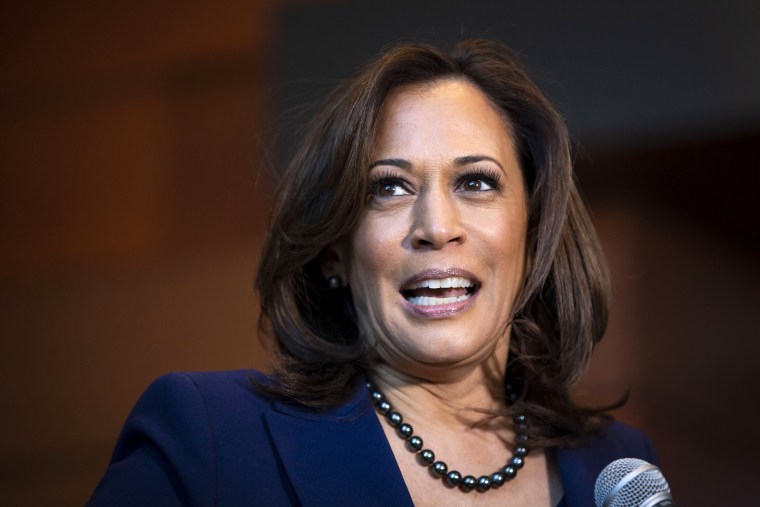As the country prepares for a transition of power after President-elect Joe Biden's projected victory, Asian American members of Congress say they’re both thrilled and energized knowing Sen. Kamala Harris will make history when she becomes vice president on Jan. 20.
Several trailblazers in their own right — from Rep. Pramila Jayapal, D-Wash., the first South Asian American woman elected to the House, to Rep. Mark Takano, D-Calif., the first openly gay person of color elected to Congress — talked about what Harris’ role as the first Black and first South Asian American female vice president could mean for the Asian American community. While the Democratic. ticket's win makes the possibility of a South Asian American occupying one of the highest offices in the nation a reality, there is still progress to be made, the legislators said.
Jayapal, who called the win a “joyous, righteous moment” for the country, told NBC Asian America that there are other ceilings that still need to be broken.
“We have other AAPI and women of color candidates and people who should also be advancing and so we have to continue to build that pipeline,” Jayapal said. “Our work is never done.”
Harris, who will also be the first child of two immigrant parents to assume the role, has been elected at a time when Asian American representation in Congress is at a record high. And in 30 states, a record number of those from the community ran for state legislature. Many Asian American lawmakers said that Harris' rise is a reflection of the progress that’s been made in the political sphere by Asian Americans.
“I have watched the meteoric rise of elected South Asian Americans over the last few years,” Rep. Ami Bera, D-Calif., the longest-serving Indian American member of Congress, said. “Having Kamala Harris as vice president will be an inspiration to the AAPI community for generations to come. I couldn’t be more excited!”
For many, the vice president-elect also resurfaces the barriers Asian Americans have had to confront to arrive at this point in history. Rep. Judy Chu, D-Calif., chair of the Congressional Asian Pacific American Caucus, pointed out that Asian Americans had long been perceived as “invisible” due to an early legal framework that kept them from civic participation and a place in America.
Legislation including the Naturalization Act of 1790, which restricted citizenship to "any alien, being a free white person," ostracized people of color from citizenship. Those from Asia were further kept from participation in the political process by other laws like the Chinese Exclusion Act of 1882 as well as the establishment in 1917 of an "Asiatic Barred Zone," which demarcated areas of Asia from which immigrants weren't allowed admission into the U.S.
The echoes of such disenfranchisement are felt today, Chu said, as visibility in the political realm continues to be an issue.
“It was rare to see an Asian American in the halls of Congress, let alone an Asian American women. So I would say that the problem has been gaining the visibility, and making sure that our issues are taken seriously,” Chu said. “Just a couple of weeks ago, there was a Ways and Means hearing, in which one of the Republicans used the term ‘China virus.’ And so I took my opportunity when it came my turn, I confronted him on that. … I don't think they expected to hear that from me. But I said it anyway.”
In some ways, Jayapal said, some segments of the community are only just beginning to cement their place in the political ecosystem, especially since the electorate’s diversity makes its political legacy difficult to capture and unify.
“I think that the South Asian American community is still defining its political stamp, its political imprimatur. And trying to assert itself as a political force in ways that are still not completely defined,” she said.
Takano noted that without Asian American representation, issues regarding the community often go unchecked, citing painful portions of his own family’s history. Takano’s parents were incarcerated as toddlers during World War II because of their Japanese ancestry.
Then, there were no Asian Americans in the House, nor were any serving in the administration at the time.
“My parents are living witnesses to a time when America’s leaders did not protect their basic civil liberties or their dignity as human beings,” he said.
He added, “From my own family history, I know what happens when no one stands up for vulnerable people.”
Even with such strides made, Rep. Ted Lieu, D-Calif., explained that Asian Americans have yet to achieve parity in multiple levels of society. He points out that not a single Asian American sits on the Supreme Court, nor had anyone of Asian descent been seriously considered to fill the late Justice Ruth Bader Ginsburg’s seat, now occupied by Justice Amy Coney Barrett. Lieu called the lack of consideration “simply not acceptable in the 21st century.” And while Asian Americans, the fastest growing racial group in the country, account for roughly 6 percent of the population, they make up 3 percent of House members.
Rep. Grace Meng, a Democrat and the first Asian American to be elected to Congress from New York, said that to keep the momentum going and close the gap, “unprecedented outreach” is crucial. She said that she will personally propose legislation or promote initiatives that aim to improve the health and safety of Asian Americans, fight discrimination, or promote the history of the group.
For now, like many in the community, Asian American lawmakers find themselves in celebration.
“For 244 years after the founding of this country, we haven't had anybody. We waited, and we waited and finally, our dreams have come true,” Chu said. “Kamala Harris shatters one of the highest glass ceilings of all.”
